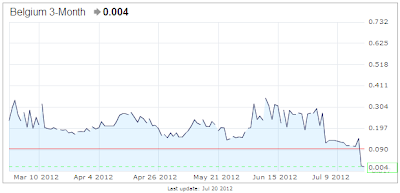On 31 July 2012 Greece finance minister Christos Staikouras told on television that Greece is on the edge of bankruptcy. If no aid comes from the ECB, Greece won't be able to pay its ECB debt obligation on 20 August 2012. Greece has a repayment due of 3.8 billion euro.
Consecutive debt repayments and spending cuts in 2012 have reduced Greece's debt to GDP from 160% to 132% (Chart 1). This means Greece is going into the right direction concerning its debt.
However, Greece depends entirely on the troika: European Commission (EC), the International Monetary Fund (IMF), and the European Central Bank (ECB). On Monday 24 July 2012, they announced the 31.5 billion euro bailout money wouldn't be available yet to Greece until September 2012. One of the reasons is because of the IMF refusing to give more aid as Greece will not be able to fulfill its promise to cut debt to 120 percent of annual economic growth in euro terms by 2020.
This means that insolvency is coming near and could have arrived as early as September 2012.
Consecutive debt repayments and spending cuts in 2012 have reduced Greece's debt to GDP from 160% to 132% (Chart 1). This means Greece is going into the right direction concerning its debt.
 |
| Chart 1: Greece government debt to GDP |
However, Greece depends entirely on the troika: European Commission (EC), the International Monetary Fund (IMF), and the European Central Bank (ECB). On Monday 24 July 2012, they announced the 31.5 billion euro bailout money wouldn't be available yet to Greece until September 2012. One of the reasons is because of the IMF refusing to give more aid as Greece will not be able to fulfill its promise to cut debt to 120 percent of annual economic growth in euro terms by 2020.
This means that insolvency is coming near and could have arrived as early as September 2012.













































